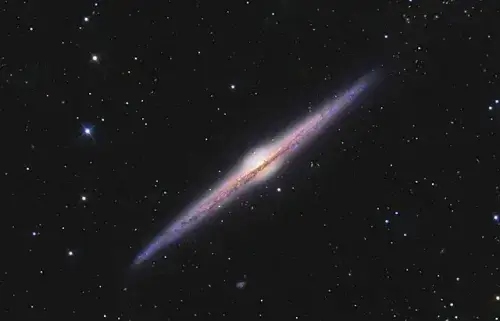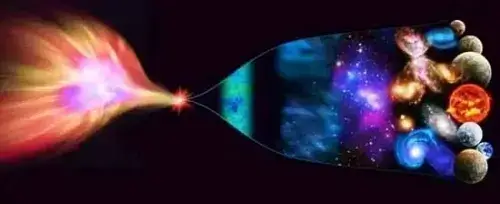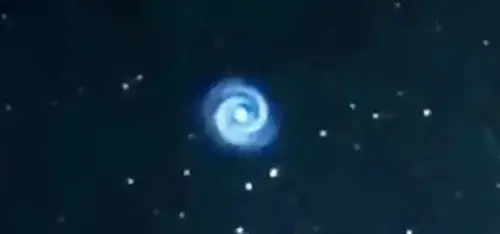Space. The leading cosmological model suggests that the universe was born about 14.7 billion years ago in the Big Bang. But what was it really like? Incredibly huge or tiny? Deafeningly loud or shrouded in silence?
And most importantly, where exactly did it happen, if there was nothing around? There are so many questions that some researchers believe that the explosion could have repeated itself several times, which means that even the name is wrong.
It turns out a rather strange picture – everyone knows about the Big Bang, but no one can say for sure what it was like.
Space, doubt, and ignorance.
After all, to talk about the beginning of time, you need to choose not only the right words, but also the right physics.
Thus, the discoveries of recent years have allowed us to form a more or less clear picture of the universe, but in trying to look into the past, we increasingly turn to particle physics.
This means that in order to learn more about cosmic infancy and the mysterious Big Bang, physicists must use concepts of high-energy physics that go beyond experimental results.
Space and mystery.
Will we ever know where it all began? The universe arose as a result of the Big Bang. But what happened before that?
Big Bang, what happened in the beginning?
The search for understanding the origin of the universe has moved from myths and legends to the quantitative findings of modern cosmology, based on general relativity and its impact on understanding the structure of the cosmos.
They say that the cosmos is immeasurable.
Yes, that’s right, the cosmos is the place we know or think we know about. The cosmos is filled with inescapable and helpless loneliness and ignorance.
Have you ever thought about loneliness, about your existence among the wonders of billions of galaxies in the universe?
I guess you have!
According to conservative estimates, there are 100 billion galaxies in the universe.
Galaxies are separated from each other by tens of millions of parsecs. The name parsec (pc) comes from the English words “parallax of one arc second”.
1 pc = 3.08567758×1016 meters
1 pc = 3.26156378 light years
The galaxy is filled with, approximately, 300 billion stars. We are in the outskirts of space, in a galaxy in which we float around a worthless little yellow star that we call the sun.
 Loneliness is enhanced by the fact that we are on a tiny and in places solid formation that we call planet Earth.
Loneliness is enhanced by the fact that we are on a tiny and in places solid formation that we call planet Earth.
Do you understand that nothing depends on us. We are nothing in space. We have nothing to define, because we can’t change anything!
NOTHING!
We raise our heads and see twinkling stars. Do you understand that many of them have long since gone out and are not where we see them now?
Nothing depends on us, we cannot light any of the stars and it is not in our power to extinguish them.
We are a greater accident among billions of galaxies in space or in the universe, as one prefers to call this great incomprehensible collection.
We are the greatest accident among accidents, and this world – even if someone created it – does not smile favorably on us.
Have you thought about how many places on planet Earth are you exposed to the danger of death?
Have you thought that among billions of galaxies, the only place where you can exist is Earth.
Space is hostile!
We are alone, alone in a cold, cruel, indifferent and impersonal cosmos, ready to kill you at any moment.
With a comet, with solar radiation, with a cataclysm of cosmic scale. I could go on, but I hope you understand your insignificance, no, a misunderstanding that happened by chance on planet Earth.
In an infinitely vast world that does not want to hear our voice, our task – no, our scale of value is close to zero.
Our loneliness is immeasurably great.
Maybe I am thickening the colors, but I cannot express my attitude to the universe in any other way. Sad, but that is how it is.
Cosmos and again the Big Bang.
The main discoveries, the expansion of the universe (which we learned from the observations of the American astronomer Edwin Hubble) and the successful construction of the Big Bang theory formed the basis of our understanding of the cosmos.
However, despite significant progress, the earliest moments of the universe and its root cause are still shrouded in mystery.
At the same time, the question “what happened before the Big Bang” always arises when one thinks about the origin of the universe.
After all, if there was no “before,” then what was the cause? Surprisingly, only a few centuries ago the answer was simple: some eternal deity set everything in motion.
Even Sir Isaac Newton believed that God created the universe about 6,000 years ago. What happened in the beginning? The Big Bang was the beginning of everything. But was there anything before it?
The Big Bang, the expansion.
Everything changed with the discovery of cosmic expansion, when the Belgian cosmologist (and Jesuit priest) Georges Lemaitre realized that the universe must have had a beginning.
True, this idea appealed to some people, and by the early 1960s Fred Hoyle’s steady-state theory was quite popular among both iconoclastic scientists and laymen.
Theory of the stationary universe.
Hoyle and his colleagues accepted the theory of the universe asexpansion, but did not believe in the Big Bang, believing that the slow, continuous creation of new matter could keep the average density and general properties of the universe constant over time.
According to the steady-state model, matter is constantly being created as the universe expands, but over time, Hoyle’s theory was replaced by the Big Bang idea, which states that the density of matter in the universe decreases as galaxies move away from each other.
Hoyle’s idea was finally rejected by the scientific community in 1964 after the discovery of the cosmic microwave background (CMB).
 Stationary theory of the universe. The steady-state model of the universe was developed in 1948 as an alternative to the Big Bang theory by Fred Hoyle, Thomas Gold, Herman Bondi, and others.
Stationary theory of the universe. The steady-state model of the universe was developed in 1948 as an alternative to the Big Bang theory by Fred Hoyle, Thomas Gold, Herman Bondi, and others.
According to this model, as the universe expands, new matter is constantly being created between the expanding galaxies.
Since then, the body of evidence supporting the origin of our universe from the Big Bang has grown so much that there is little doubt about it.
True, the question of what came before remains unanswered, and many scientists choose to ignore this question because it seems that we will never know the answer to it.
The Big Bang, the beginning of time.
Note that when astronomers talk about the Big Bang, they usually mean not the very beginning of the universe (time zero), but the incredibly hot and compact state of the universe in the first few minutes of its existence.
To some extent, this is due to the fact that no one has the slightest idea of the true nature of time, let alone its beginning.
The British physicist Julian Barbour, for example, argued that time does not exist at all, except as an illusion in our minds.
According to others (including Stephen Hawking), time came into being with the universe, making the very concept of “before” meaningless.
Asking what happened before the Big Bang is like asking what is north of the North Pole or what distance is less than zero.
We may never know what happened before the Big Bang. On the other hand, we simply do not know whether there was time before the Big Bang or not.
According to the once popular idea of a cyclical universe, the current expansion of the cosmos could one day turn into a contraction.
If anything, it could turn into a new Big Bang, AND… begin the next cycle of eternal order.
The cosmos, the multiverse, is an incomprehensible quantity.
Of course, this is just one of many hypotheses according to which our universe is not unique, but, one way or another, is part of a possibly infinite multiverse.
 But if the multiverse is also infinite in time, then we are back to the idea that everything has existed forever, which means that the question of what happened before the Big Bang simply loses its meaning.
But if the multiverse is also infinite in time, then we are back to the idea that everything has existed forever, which means that the question of what happened before the Big Bang simply loses its meaning.
Finally, South African physicist Neil Turok believes that the Big Bang created not only our universe, but also the Antiverse, which is made of antimatter and moves backwards in time.
Again, an intriguing idea, but without any observational possibilities to obtain confirmation (or disprove!).
Ultimately, we seem to have to admit that we know nothing about the true beginning of the universe.
And even if we are inclined to the idea of an eternal multiverse that has no real beginning at all, we do not know why there is something (or why everything exists) rather than nothing.
We can’t say anything about that either.
Good day!


